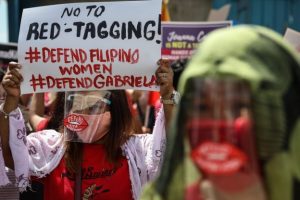By: Thea Bonifacio
Journal of Global Rights and Organizations, Associate Articles Editor
MANILA, Philippines – With national elections approaching in 2022, the Philippine government, under President Rodrigo Duterte, has escalated its red-tagging efforts in a bid to silence opposition. As a result, the current government’s propaganda has led to increased deaths in the past year.

Red-tagging is the act of accusing a group of persons as communists, or sympathizers, and publicizing these persons as “Enemies of the State,” attempting to violently overthrow the government. However, these accusations are commonly baseless and are targeted at dissenters or at civilians aiding minority or indigenous groups.
Last December 2020, a doctor and her husband were gunned down in broad daylight. Prior to her death, Dr. Mary Rose Sancelan had appeared on an unverified list from the local militia group “Kagubak,” which linked Sancelan to the New People’s Army (NPA). Sancelan had spearheaded her community’s response to COVID-19. In January 2021, the Armed Forces of the Philippines (AFP) published a list of alumni and academics from the University of the Philippines, the national university, claiming they were current NPA rebels. Recently, a lieutenant general accused a journalist of “aiding terrorists by spreading lies” when the journalist had earlier reported on a Supreme Court petition that alleged that soldiers tortured members of an Indigenous community.
Under the Philippine 1987 Constitution Article II Section 2, the Philippines adopts the generally accepted principles of international law as part of the law of the land. Additionally, the Philippines is one of the first countries to support the Universal Declaration of Human Rights (UDHR). Thus, the country has accepted Article 18 of the UDHR—the right to freedom of opinion and expression, including the right to hold opinions without interference.
Red-tagging is an indirect attempt to suppress civilians’ freedom of expression. The activity criminalizes the perpetuation of socialist practices that have helped society to various degrees. Dissent towards ineffective government responses and clamors for change becomes more challenging to continue when a label could lead to one’s death. A June 2020 report by the UN Office of the High Commissioner for Human Rights found that red-tagging in the Philippines has “posed a serious threat to civil society and freedom of expression.”
According to Neri Colmenares, a former House Representative, the escalated red-tagging of government critics is directly linked to the upcoming 2022 elections. Two specific reasons are connected to this escalation. First, dissent and criticisms towards the government’s COVID-19 response and the killings of human rights activists are mounting, which require more active tagging to stifle dissent. Second, the government fears that their candidates for the upcoming elections are not fairing well in surveys, which start as early as 2 years before elections.
As the Philippine national elections start closing in, there is a need to stay vigilant of the government’s attempts to monopolize and police free expression. The upcoming months will be a test to see whether the act of red-tagging will be penalized, with the Philippine Senate spearheading the efforts to combat the repressive act.
For further information, please see:
Human Rights Watch – Philippine General Should Answer for ‘Red-Tagging’ – 10 Feb. 2021
LiCAS.News Philippines – Yes, let’s talk about red-tagging as censorship – 31 Oct. 2020
United Nations Universal Declaration of Human Rights -– 10 Dec. 1948
Voice of America – Deadly ‘Red-Tagging’ Campaign Ramps Up in Philippines – 18 Feb. 2021